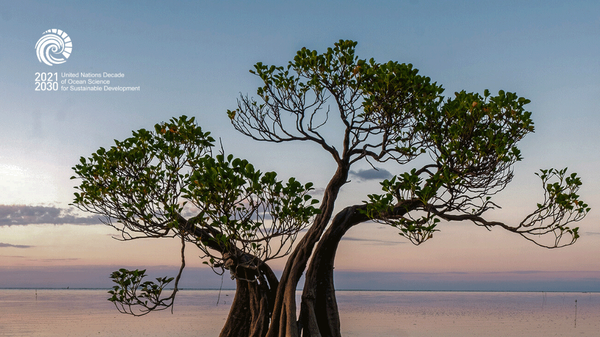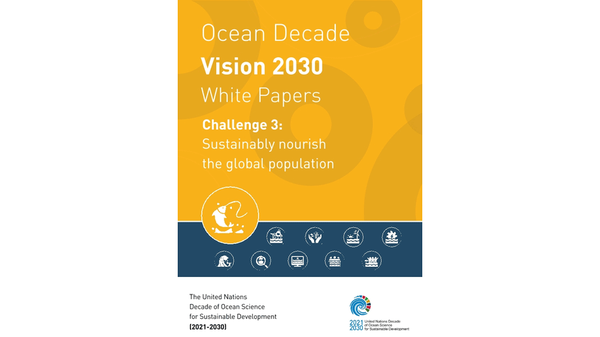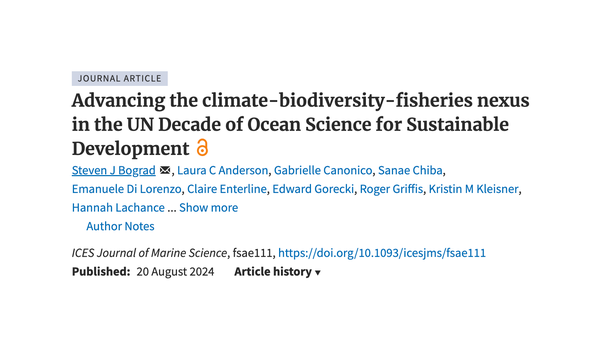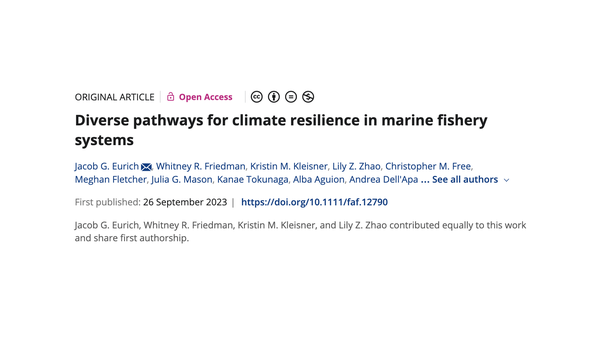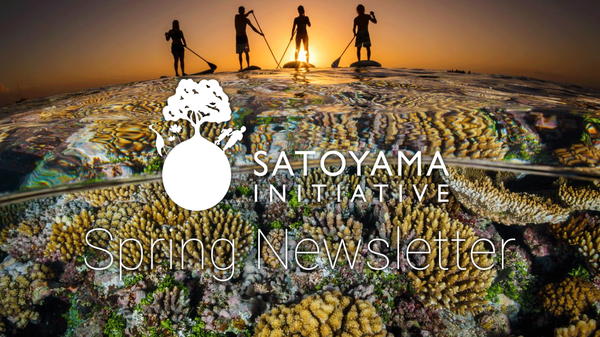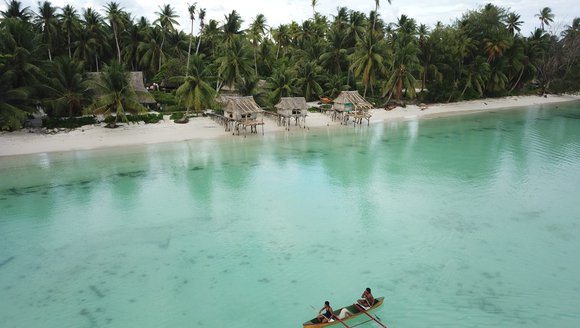The FishSCORE2030 Approach
Advancing climate resilience in marine fisheries.
Working in partnership with marine fishery rights-holders and stakeholders around the world, FishSCORE2030 aims to advance climate resilience, sustainability, and equity in marine fisheries through climate assessments, actionable strategies, and a global research network to achieve sustainable development goals in a changing ocean.
Through the FishSCORE2030 program, we aim to:
- Co-produce information, tools, strategies, and policy recommendations for climate resilience of fishery systems.
- Strengthen existing capacities and approaches for identifying and employing climate resilience strategies in diverse types of fishery systems.
- Support the implementation of policies, processes and solutions to advance climate resilience on local, regional, national, and international scales.
To date, climate considerations in fisheries management have largely focused on how climate conditions may alter fish stocks and appropriate harvest levels. The FishSCORE2030 approach encourages consideration of a broader suite of ecological, social, economic, governance, and cultural features that influence how climate impacts may affect a fishery and the ability of the fishery to adapt to change. This includes the inclusion of Indigenous and local knowledge and knowledge-holders in the development of projects and recommendations.
FishSCORE2030 supports knowledge co-production as an iterative, collaboration-building process that brings together multiple types of knowledge and ways of knowing to develop a systems-oriented understanding of the impacts of climate change on diverse marine fisheries. Through the program, we aim to support on-going and new work at local, regional, national and international scales that will identify potential solutions to climate resilience in fisheries and elevate local knowledge and experiences in decision making.
FishSCORE2030 supports collaborations that enable knowledge exchange and improve resources for climate-resilient fisheries, ensure scientific information is translated and tailored for applied needs, and advance use of climate information in real-world fishery systems. This co-development and application approach strengthens partnerships and builds capacity for forward-looking resilience planning in marine fisheries across the globe, including large-scale industrial and small-scale artisanal fisheries.
Knowledge Co-production
An approach based on knowledge co-production is specifically relevant when considering the impact of climate change on fisheries. Scientific information of natural and socioeconomic environments, local knowledge and voices, and management experience are needed together to support existing and develop new adaptation actions. Local knowledge of fishery systems is necessary to contribute long-term perspectives gained through experience that provide a deep understanding of drivers, patterns, and impacts of these changes, as well as real time observations of changes at scales that are not easily observed by most scientific surveys. Local knowledge and local voices, together with scientific research and modeling, will develop relevant and appropriate climate resilience strategies.
FishSCORE2030’s co-production approach will facilitate collaboration and information exchange among partners to better understand climate change impacts in local and regional fishery systems, refine resilience strategies within specific fisheries, and advance recommendations appropriate to the fishery’s economic, social, and governance systems. The approach stresses the importance of working with existing local and regional efforts and supporting existing resilience strategies and pathways within communities. FishSCORE2030 will also engage partners in helping synthesize and elevate policy and science priorities that emerge from multiple local and regional resilience efforts.
Contributing to the UN Ocean Decade
FishSCORE2030 will advance collaboration and application experiences among diverse types of marine fisheries and fisheries constituents, including those from developing and least developed countries and marginalized or underrepresented groups, and will thereby contribute to equity of knowledge and capacity among fishery systems. Through an interdisciplinary network that incorporates and elevates local voices, FishSCORE2030 will support processes and solutions that enable fisheries communities and marine resource economies to thrive into the future.
With these efforts, FishSCORE2030 will contribute to a number of UN Sustainable Development Goals, including supporting healthy marine ecosystems and fisheries (SDG 14), poverty reduction (SDG 1), food security (SDG 2), human health and well-being (SDG 3), gender equality (SDG 5), climate action (SDG 13), and partnerships for the goals (SDG 17).

-
FishSCORE2030 in the UN Ocean Decade
Explore publications that the FishSCORE2030 network has contributed as part of the UN Ocean Decade program.
- An ocean of life: how the UN Decade of Ocean Science for Sustainable Development is supporting implementation of the Kunming-Global Biodiversity Framework
- Ocean Decade Vision 2030 White Papers: Challenge 3: Sustainably nourish the global population
- Advancing the climate-biodiversity-fisheries nexus in the UN Decade of Ocean Science for Sustainable Development
- Diverse pathways for climate resilience in marine fishery systems
- The Decade of Ocean Science and the Satoyama Initiative Plan of Action 2030
Through transdisciplinary scientific collaborations and partnerships with fishers, resource managers, community practitioners, and policymakers across fisheries sectors and contexts, FishSCORE2030 will develop and apply information needed to support decisions, plans, and policies that will enhance the resilience of marine fisheries to climate change. These aims will be achieved through building collaborations, capacity building activities, research applications, information synthesis, and recommendations for practices and policies.
During the UN Ocean Decade of 2020–2030 and beyond, FishSCORE2030 will:
- Expand and strengthen a network of collaborators including scientists, fishery participants, policy experts, managers, and community and development practitioners through:
- Virtual seminar series
- Virtual and in-person workshops
- Topic-based working groups
- Work with local and global practitioners to support benchmark resilience assessments and planning efforts
- Advance local, regional, and global understanding of climate challenges facing marine fisheries and how these may be compounded by other stressors, as well as of inherit resilience attributes and strategies for operationalizing climate resilience
- Synthesize insights from multiple assessment and planning efforts to compare resilience approaches and understand factors that influence resilience pathways
- Develop and improve frameworks, tools, resources, and recommendations to support climate resilience assessments, planning, and transformative actions
- Support the near-term adoption of actionable climate resilience practices in fisheries activities and policies.

Return to the FishSCORE2030 home page.
Coordination Group



Upcoming FishSCORE2030 Events
Read More
-
FishSCORE2030: Supporting Climate-Resilience in Fisheries
GMRI Research Scientist Dr. Kathy Mills is leading a new collaborative effort to build an international network of scientists, stakeholders, and practitioners who will identify …
Tidings
-
Supporting climate-resilient fisheries during the UN Decade of Ocean Science
A new “Food for Thought” study, which we contributed to and which has been published in ICES Journal of Marine Science, outlines FishSCORE’s strategies and …
Press Clips
-
GMRI Scientist Awarded Prestigious CINAR Fellowship
Senior Research Scientist Dr. Kathy Mills is one of four researchers awarded the CINAR Fellowship in Quantitative Fisheries and Ecosystem Science.
Announcements
-
New: Climate & Fisheries Planning Tool
The Science for Nature and People Partnership (SNAPP) working group on climate-resilient fisheries, led by GMRI Senior Research Scientist Dr. Kathy Mills, recently developed a …
Tidings
